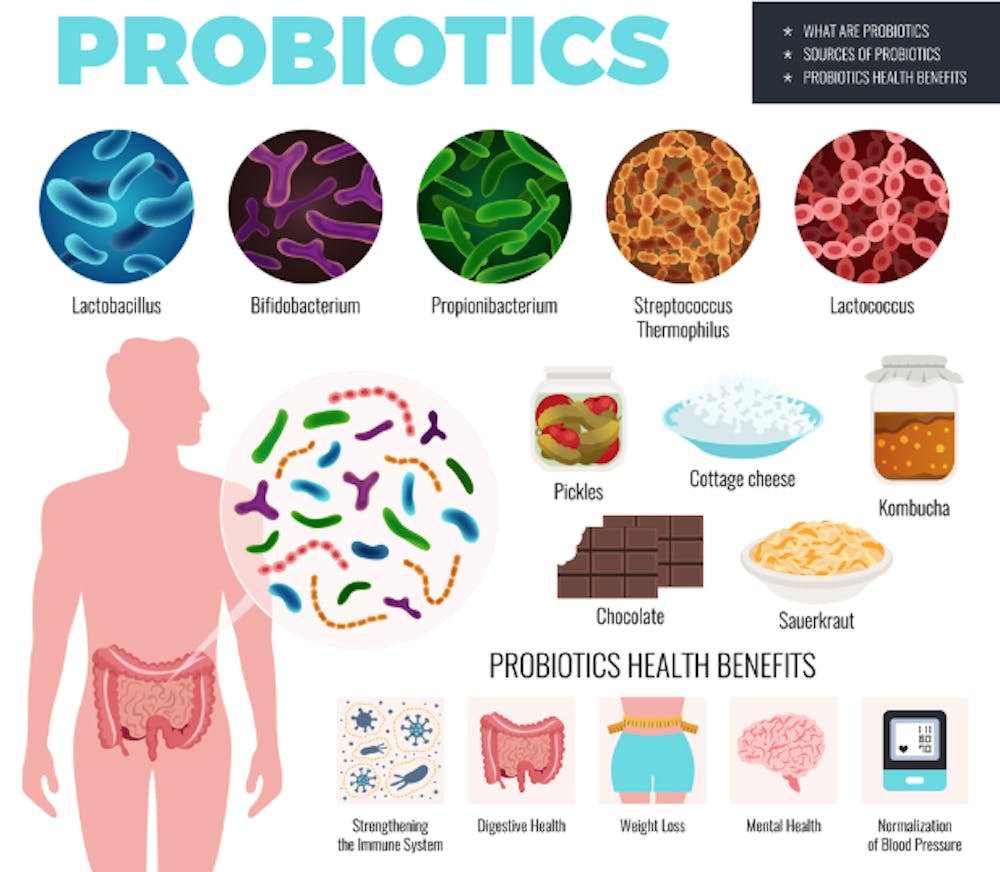Probiotics have gained significant attention in recent years for their potential health benefits. These living microorganisms (often referred to as "good bacteria") promote a healthy gut and offer a wide range of advantages for individuals of all ages. From infancy to our golden years, incorporating probiotics into our daily routine can profoundly impact our overall well-being.
A Healthy Gut
Our gut microbiomes consist of trillions of microorganisms residing in our digestive tract that play crucial roles in our overall health. It helps digest food, synthesizes vitamins, regulates the immune system, and even influences our mood. A gut microbiome imbalance in the gut microbiome, known as dysbiosis, can lead to numerous health issues, including digestive disorders, allergies, and even mental health conditions.
One way to maintain a healthy gut microbiome is by consuming probiotics. These beneficial bacteria can be found naturally in fermented foods like yogurt, kefir, sauerkraut, and kimchi. Alternatively, they can be taken as supplements. Regardless of the source, probiotics work by colonizing the gut, crowding out harmful bacteria, and restoring the balance within the microbiome.
Probiotics at a Young Age
From the earliest stages of life, probiotics are crucial for developing a healthy immune system. Infants acquire their first dose of beneficial bacteria during childbirth and through breastfeeding. Studies have shown that infants supplemented with probiotics experience a reduced risk of developing allergies, eczema, and respiratory infections. Additionally, probiotics can help alleviate colic and promote healthy digestion in newborns.
As children grow, their gut microbiome continues to evolve. However, factors such as poor diet, stress, and the use of antibiotics can disrupt this delicate balance. Introducing a kids probiotic can support their immune system and digestive health. Moreover, studies have demonstrated that probiotics may enhance cognitive function and improve mood, potentially benefiting children with behavioral disorders such as ADHD.
Probiotics During Our Teen Years
Adolescence brings about significant physical and hormonal changes. Teenagers often experience digestive issues, skin problems, and mood swings during this period. Probiotics can be a valuable tool in managing these challenges. By modulating the gut microbiota, probiotics can help alleviate symptoms of acne, promote healthy bowel movements, and contribute to a more stable mood.
Digestive Health in Adults
Adults face their own health concerns, from gastrointestinal disorders to weakened immunity. Probiotics can be particularly beneficial for individuals with conditions such as irritable bowel syndrome (IBS), inflammatory bowel disease (IBD), and lactose intolerance. Some strains of probiotics may help alleviate symptoms and improve overall gut health in these populations.
Furthermore, as we age, the diversity and abundance of beneficial bacteria in the gut tend to decline. This age-related decline, known as dysbiosis of aging, is associated with various age-related diseases and a weakened immune system. Regular intake of probiotics can help counteract this decline by replenishing the gut with beneficial bacteria, improving nutrient absorption, and reducing the risk of infections.
Probiotics for Seniors
Older adults are particularly susceptible to infections and complications related to antibiotic use. Antibiotics, while necessary to combat bacterial infections, can disrupt the gut microbiome and lead to diarrhea and other gastrointestinal issues. Probiotic supplementation during and after antibiotic treatment has shown promising results in preventing and treating antibiotic-associated diarrhea and reducing the risk of Clostridium difficile infection.
In addition to their direct impact on gut health, probiotics have been associated with numerous systemic benefits. They can enhance immune function, reduce inflammation throughout the body, and improve overall cardiovascular health. Research suggests that certain strains of probiotics can help lower blood pressure, reduce cholesterol levels, and regulate blood sugar levels, thereby reducing the risk of some diseases.
Moreover, probiotics have been linked to improved mental health. The gut-brain axis, a bidirectional communication system between the gut and the brain, is influenced by the gut microbiome. Probiotics can positively modulate this axis, leading to potential benefits for mental well-being. Studies have indicated that probiotic supplementation may help reduce symptoms of anxiety and depression, as well as improve cognitive function and memory.
Keep Your Gut Health Up
The importance of maintaining a healthy gut microbiome cannot be overstated. From infancy to old age, probiotics are vital to promote digestive health, strengthen the immune system, and even influence our mental well-being. By incorporating probiotics into our daily routine, whether through food sources or supplements, we can optimize our gut health and support overall wellness at every stage of life.
So, go with your gut, and embrace the power of probiotics. Your body will thank you for it.
This post is provided by a third party who may receive compensation from the products or services they mention.


